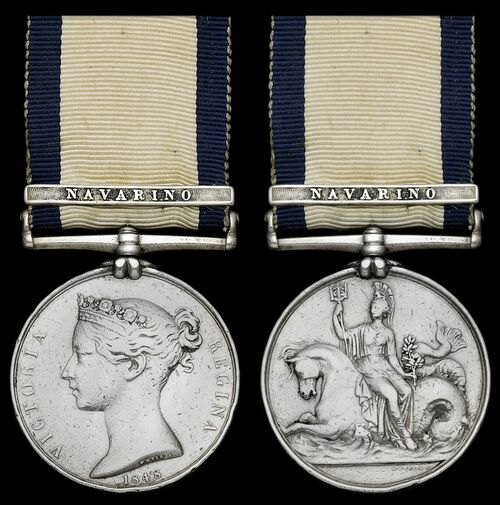
Auction: 23002 - Orders, Decorations and Medals
Lot: 2
Naval General Service 1793-1840, 1 clasp, Navarino (Henry Ceeney.), contact marks, nearly very fine
Henry Ceeney is a unique name upon the roll of H.M.S. Glasgow on which he served as an Armourer.
The Battle of Navarino was fought on 20 October 1827, during the Greek War of Independence (1821-29). A combined Turkish and Egyptian armada was destroyed by an allied British, French, and Russian naval force at the port of Navarino (now Pylos), in southern Greece. The Allied ships were better armed than their Egyptian and Turkish enemies, and their crews better trained, resulting in a rather quick victory. Some say that, due to the larger number of Turkish ships present, if the Allies had not been properly in position, the battle could have gone the other way.
The various Greek forces had achieved significant results against the Turkish fleet in 1821-24, but despite this a Turkish and Egyptian army had reconquered Crete and part of the Morea by mid-1825. The Turkish fleet was then able to return and base itself at places like Navarin and Missolonghi to help its land army. After several more skirmishes between Greece and Turkey, other countries decided to step in to help the Greeks and to protect their shipping, which was being raided by Greek pirates. The Treaty of London (6 July 1827) stipulated that if the treaty were rejected, the allied forces would sail against the Turkish forces. The Turkish/Egyptian fleet, which had been warned by the British and French to stay away, left Alexandria 5 August 1827 and arrived at Navarino 8 September. Codrington arrived 12 September and instituted a blockade. The Turks made several attempts to leave the bay and sail north, but they were repelled each time by Codrington's presence and by adverse weather, and by the arrival of a French squadron under de Rigny on 13 October. A Russian squadron under Geiden arrived on the 13th also. More ships were already at Navarino, and others arrived over the following week.
Ibrahim Pasha could not leave Navarino Bay but continued to wage war on land. On 17 October Codrington, de Rigny and Geiden tried to arrange an armistice so that Ibrahim Pasha would stop this. The Greeks quickly agreed, but the Turks did not. The Turks' answer to this was unsatisfactory: Ibrahim Pasha's officers pretended not to know where he was. The Allied commanders decided to anchor their ships in Navarino Bay, amid the Turko-Egyptian fleet. The Allied fleet entered in two lines, one formed by the English and French ships, the other by the Russian ships. The Turko-Egyptian fleet was anchored in a horseshoe formation, and the Allied fleet anchored in the empty area in the centre of this horseshoe. While the fleet was still anchoring, the captain of Dartmouth sent a boat to a Turkish ship anchored close by in order to demand that a fireship which was close to one of the British ships and appeared to be being set alight be removed. For reasons not quite clear, the Turks fired on the boat, killing the officer in command and several crew members. Dartmouth opened fire, and within a short time, the entire Allied fleet became engaged, as well as the Russian ships which were still entering the harbour. Heavier Allied broadsides and better gunnery quickly told, and in a few hours, three quarters of the Turko-Egyptian fleet was either sunk or set on fire by their own crews. On 17 November it was reported that the Turko-Egyptian ships remaining afloat in Navarino Bay were 1 battleship and 4 frigates damaged, and 1 rasee battleship, 2 frigates, 5 corvettes, 11 brigs and 5 schooners ready for sea, although this included some ships from Modon which had arrived after the battle. Allied casualties were about 181 men killed and about 480 men wounded; Turkish and Egyptian casualties were given as 4,109 (3,000 killed and 1,109 wounded, although those figures might be reversed).
H.M.S. Glasgow was a 50-gun frigate from 1814; she had previously seen service at Algiers in 1816 and at Navarino in 1827 and was broken up 1829.
Subject to 20% VAT on Buyer’s Premium. For more information please view Terms and Conditions for Buyers.
Estimate
£1,200 to £1,800
Starting price
£1200




